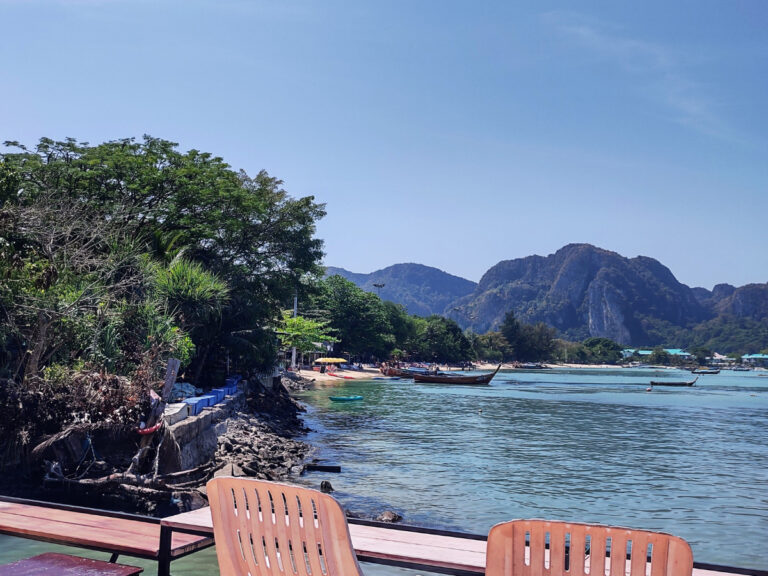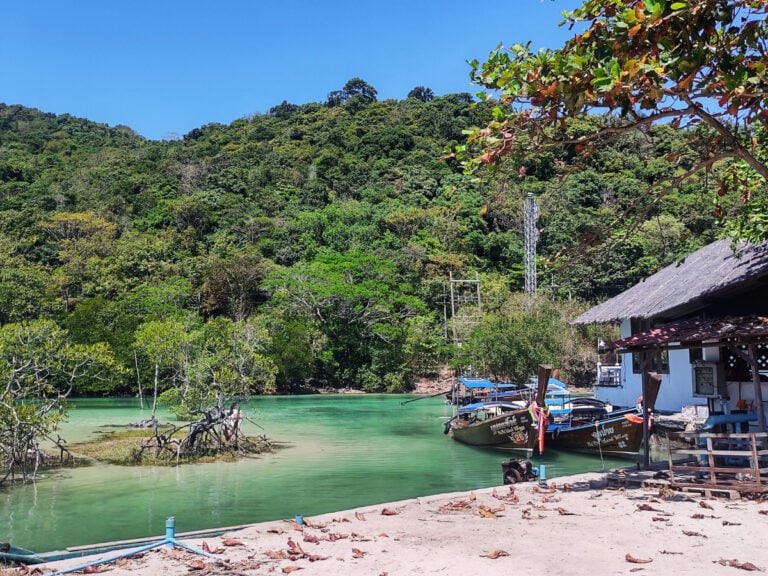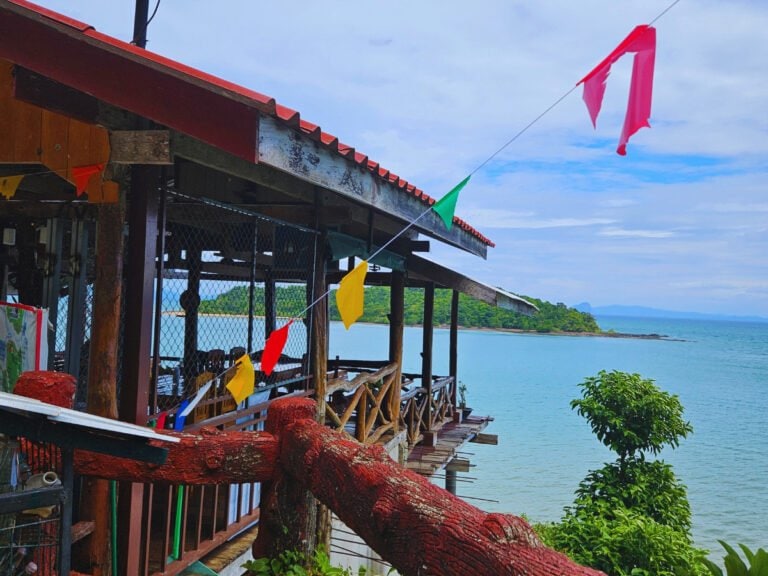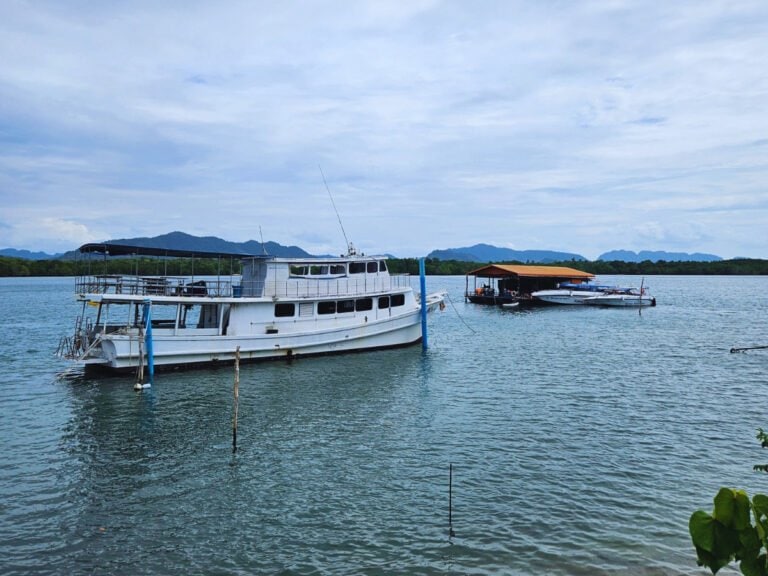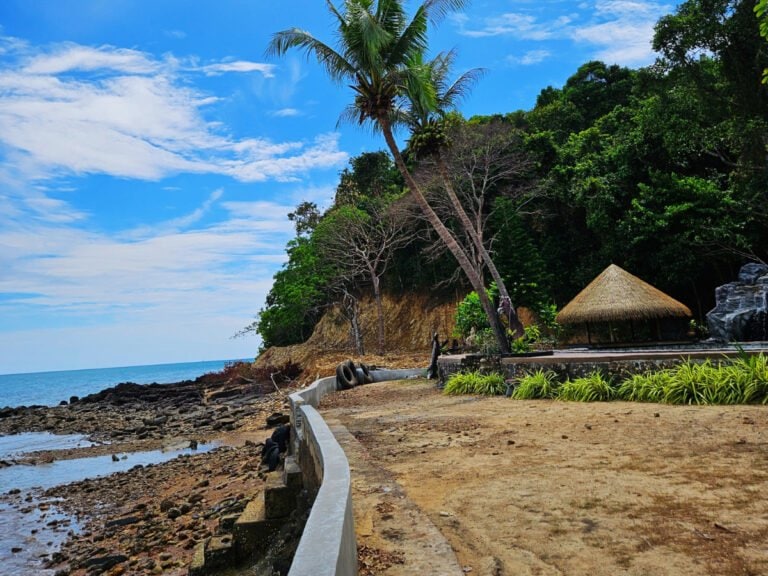Thailand for First-Time Travellers: Practical Safety Tips for Visiting Southern Thailand
Modified on
Thailand, known as the “Land of Smiles,” is a popular destination for travellers from around the world.
And it’s a safe, friendly, and adventure-filled country.
However, as a first-time visitor, you might have some concerns about safety and wonder if it’s the right place for your vacation.
I had the same worries—I read and heard many things about Thailand and spent hours researching online forums.
But just a few hours after arriving in Thailand, my concerns disappeared.
I quickly fell in love with the country and ended up staying there for a month.
I was both vacationing and working remotely, and found it to be one of the safest places to explore in Southeast Asia.
If you have similar worries, read the tips below to help you feel more confident and avoid unnecessary stress.
I share my experiences with handling money, dealing with tropical weather, enjoying street food, navigating rough seas, and much more.
Read on to prepare for your journey—or stop hesitating and buy that plane ticket! Southern Thailand is a beautiful place you won’t ever forget.
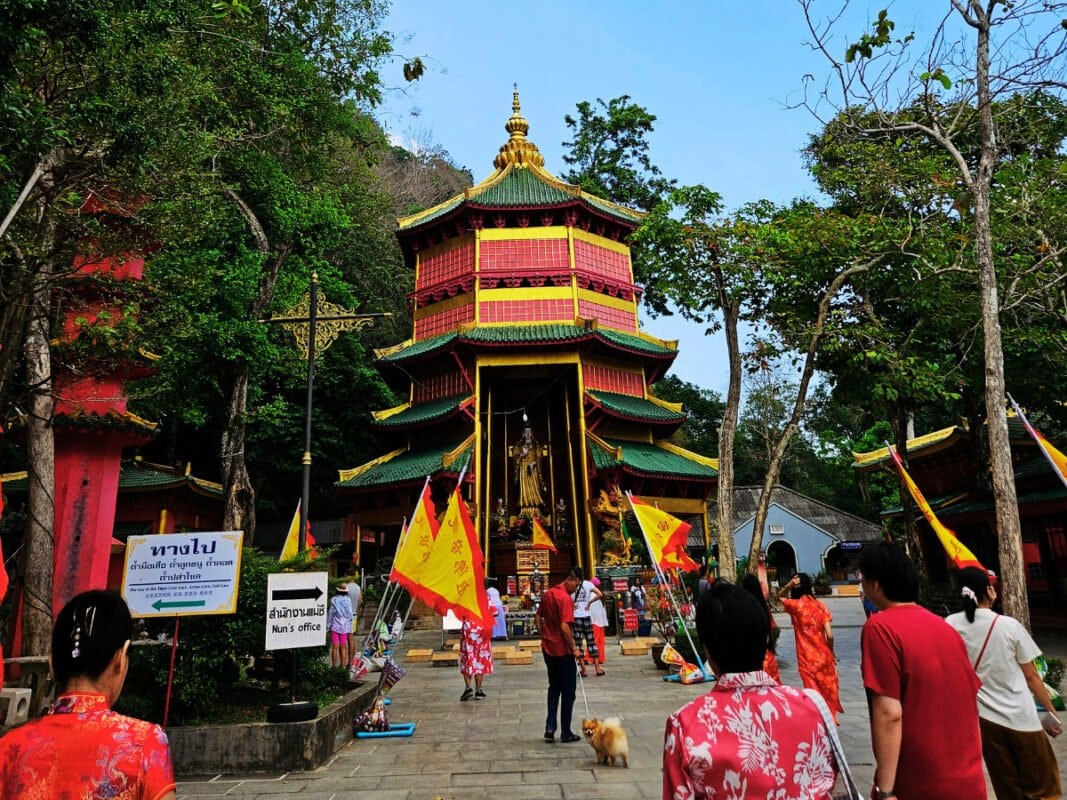
21 Safety Tips for Traveling in Southern Thailand
1. Swimming During the Off-Season
Thailand is a tropical country that is hot all year round.
When visiting, travelers need to consider whether it’s the monsoon or dry season.
The high season on the Andaman Coast (west) runs from November to April. If you plan to visit the Gulf of Thailand (east coast), the best time for a beach holiday will be from June to October.
During the high season, waters are typically calm, and you won’t experience much rain.
This is the perfect time to visit Southern Thailand, as all the hotels, bars, and restaurants will be open, and tourist spots will be lively.
However, many people decide to visit Thailand’s coasts during the off-season, as it can be cheaper and much calmer.
That being said, monsoon season might be a more challenging and less safe time to visit Thailand’s popular spots like Krabi or Koh Phi Phi.
Check conditions and only swim when the water is calm.
- Watch for Warning Signs – Beaches post red flags to indicate dangerous swimming conditions. Be aware of these signs and avoid swimming in rough waters.
- Choose Sheltered Beaches – Some smaller beaches are more protected from strong waves and wind than wider, more exposed beaches. Explore different beaches to find the safest spot.
- Avoid Swimming Alone – During rough seas, it’s safest to swim in areas with other swimmers nearby or, preferably, with lifeguards.
- Be Mindful of Pollution – The monsoon season also brings debris and plastic waste from surrounding regions, making swimming less appealing and sometimes dangerous.
2. Jellyfish
Jellyfish can occasionally be found in Thai waters, floating unpredictably in the sea.
Their stings are painful and can require immediate attention, so avoid swimming in areas known to have jellyfish.
- Check for Jellyfish Warnings – Some beaches post warnings if jellyfish are present. Always heed these signs and avoid swimming in affected areas.
- Use Vinegar as First Aid – If you get stung, seek immediate help and use vinegar for relief. Many local beach shops keep vinegar on hand to treat stings.
3. Sand Fleas on Beaches
Sand fleas, or sand flies, are common on many of Thailand’s beaches, particularly at dawn and dusk.
These tiny insects can leave unpleasant, itchy bites that last for days.
To ensure you can enjoy the beach without discomfort, take some precautions
- Sit on a Towel or Beach Mat – Avoid sitting directly on the sand, especially during high-risk times when sand fleas are most active.
- Use Insect Repellent – Apply bug spray to your legs and ankles to keep sand fleas away.
- Limit Beach Time at Dawn and Dusk – Sand fleas are most active during these hours, so try to avoid sitting on the sand if possible.
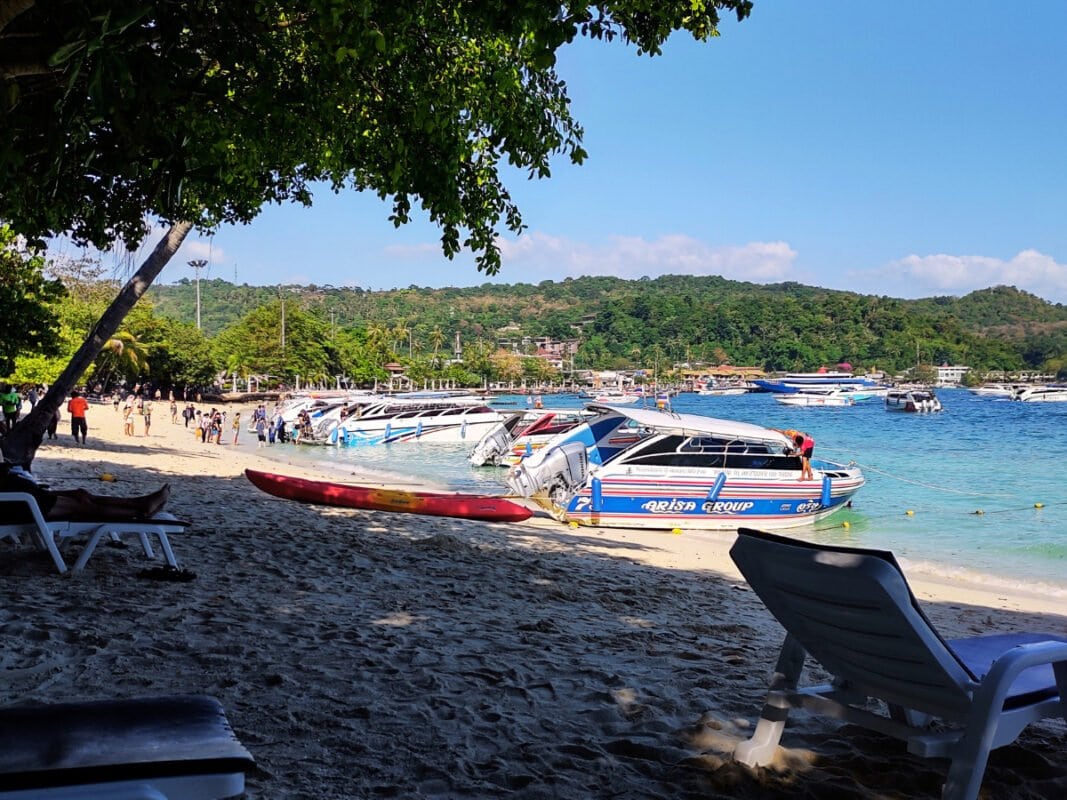
4. Speedboats and Rough Seas
Island hopping is one of the most popular activities in Southern Thailand, and speedboats are a fast way to travel between destinations.
However, these rides can be bumpy, even when seas are not rough.
- Bring Motion Sickness Medicine – If you’re prone to seasickness, take medication before your trip to avoid discomfort.
- Wear a Life Jacket – Life jackets are provided on all speedboats. Although you might not be required to wear one, it’s always best to do so for safety.
- Use a Dry Bag – To protect your valuables, place them in a dry bag or a waterproof plastic bag that can be worn around your neck. These items are easily available for purchase in Thailand.
- Choose a Ferry – For a smoother and more comfortable experience, consider taking a ferry. While ferries are slower than speedboats, they offer a more stable ride.
5. Heat and Sun
Thailand’s tropical climate can be quite intense, especially during the dry season.
Travelers unused to heat and humidity might have a hard time getting used to the tropical weather.
Be careful, as overexposure can lead to dehydration or even heatstroke.
- Stay Hydrated – Drink plenty of bottled water and try fresh coconut water or other delicious drinks and fruit served on Thai beaches.
- Wear Sunscreen and a Hat – Apply sunscreen regularly and wear a hat when walking outside during the day.
- Plan for Early or Late Activities – If possible, avoid strenuous activities like hiking around midday. Mornings and late afternoons are cooler and more comfortable for climbing steep stairs or visiting a jungle.
- Wear Flowy, Breathable Clothes – To stay comfortable and minimise sweating, wear quick-drying, loose-fitting clothes.
6. Drinking Water
Tap water is unsafe for drinking in Thailand.
Even boiling it won’t remove all contaminants, so it’s best to stick to bottled or filtered water.
- Use Bottled Water for Everything – Use bottled water for drinking, cooking, and even brushing your teeth to avoid potential health issues.
- Avoid Ice in Rural Areas – While ice is generally safe in tourist hubs (I never had any issues), it may not be filtered in more remote destinations.
- Bring a Portable Water Filter – If you’re eco-conscious and want to reduce plastic waste, bring a portable filter or purifier bottle.
7. Thai Cuisines and Street Food
Trying local food is one of the highlights of visiting Thailand, so don’t be afraid to explore!
Thai food is world-famous but can be quite spicy or prepared with unfamiliar ingredients.
Take some basic precautions to fully enjoy Thai cuisine –
- Choose Busy Food Stalls – Popular stalls with high turnover are usually safer, as the food there is fresher.
- Start Slowly with Spice – Thai food can be very spicy. If you’re not accustomed to it, start with milder dishes like green curry or pad Thai and gradually build your tolerance.
- Eat Cooked Foods Over Raw – Stick to fried, steamed, or grilled dishes, especially when trying new foods.
- Limit Meat – While I have never experienced food poisoning in Thailand, I am not a meat eater. You don’t have to go vegetarian, but keep in mind that meat can spoil more easily and may cause stomach issues for some tourists. Consider trying dishes with tofu or vegetables for variety.
- Eat Fish by the Sea – If you are visiting southern Thai islands, you’ll have the opportunity to try fresh seafood and fish. Many restaurants serve daily-caught fish, making it easy to enjoy delicious, fresh meals.
- Bring Medication – Anti-diarrhea and antacid medicines can be helpful if you’re sensitive to spicy or new foods.
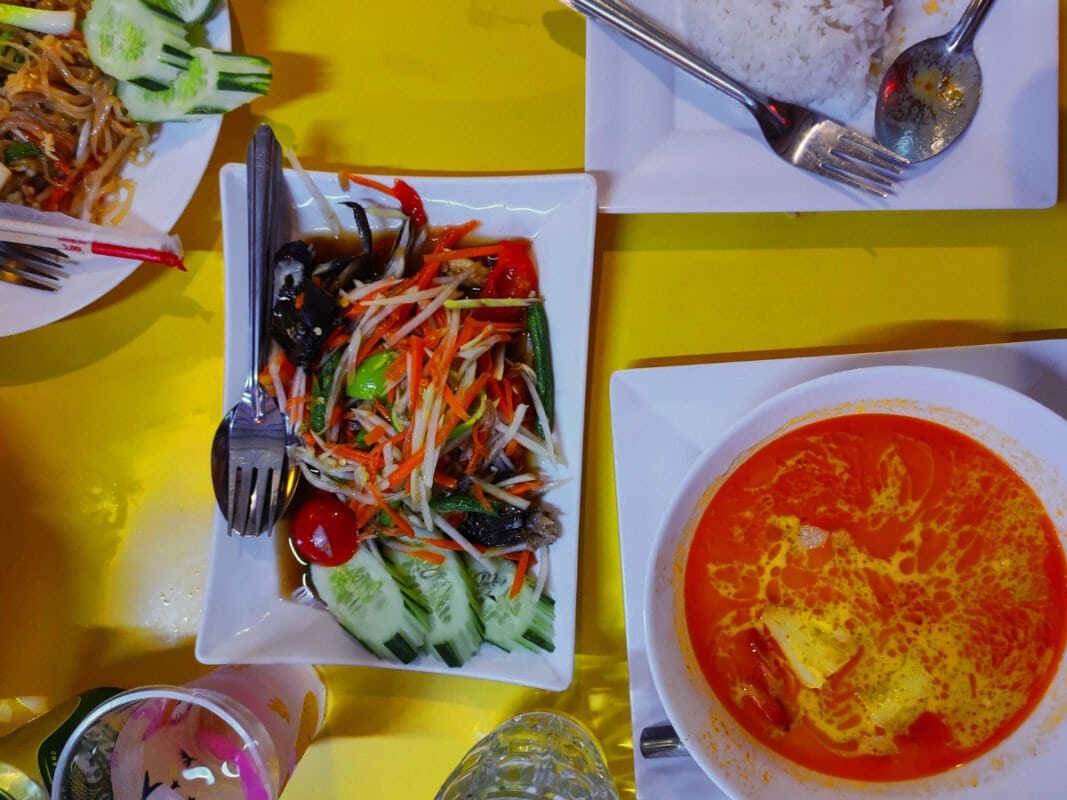
8. Driving Culture
Thailand’s traffic can be chaotic, especially in larger cities.
Renting a scooter is a popular way to explore the country independently, but there are important safety tips to follow:
- Always Wear a Helmet – Helmets are legally required for drivers and passengers. Apart from being crucial for safety, you can be fined for not wearing one. While many locals might drive without helmets, it’s wise to set a better example.
- Get an International Driver’s Permit (IDP) – This is required for legal driving in Thailand, even for scooters. Although rental shops may not check for an IDP, the police might. An IDP is also necessary for insurance coverage in the event of an accident.
- Drive Defensively – Local drivers may not always follow traffic rules, so stay alert and be prepared for sudden lane changes or unpredictable driving behavior.
- Learn Driving in Less Busy Places – If you have a driving license but are unfamiliar with driving a moped, practice in quieter areas first. Find a small rural road or parking lot to build confidence before going to busier streets. If you ask at the rental shop or in your hotel, you might even find a local person willing to help you learn.
- Consider Other Transportation Options – If you’d rather not drive, Thailand has reliable public transportation options. Taxis, tuk-tuks, songthaews (shared taxis), and transport apps are widely available and convenient, especially in tourist destinations.
9. Respecting the Royal Family and Cultural Norms
Thailand has a rich cultural heritage, and respecting local customs is essential to avoid misunderstandings.
Respect for the monarchy is deeply ingrained in Thai culture, and strict laws prohibit any form of disrespect toward the royal family.
- Avoid Talking About the Royal Family – Criticism or negative comments are not well-received and can lead to serious consequences.
- Respect Thai Currency (Baht) – The Thai baht features the king’s image, so avoid stepping on or crumpling it. Disrespecting the currency is viewed as disrespecting the monarchy.
- Dress Modestly at Temples and Sacred Sites – When visiting temples, covering your shoulders and knees is respectful and often required. If you don’t wear appropriate clothing, you might be denied entry.
10. Dress Code and Modesty
While Thailand’s beach resorts are accustomed to Western tourists, dressing modestly when away from the beach or in less touristy areas is important.
Southern Thailand, in particular, has a significant Muslim population, and locals often dress modestly.
Being mindful of your attire shows respect for Thai culture and traditions.
- Cover Up When Visiting Temples – For both men and women, covering shoulders and knees is not just respectful but often mandatory. Without appropriate attire, entry to temples might be prohibited.
- Avoid Walking Around Town in Beachwear – Swimsuits and bikinis should be kept for the beach or pool areas. As a general guideline, dress as you would in your home country.
- Although the Thai climate is hot, wearing overly revealing clothing, like a thong bikini, to places like hotel breakfasts can be uncomfortable for other guests (like me) and staff.
- Observe Local Dress Codes – Many popular sites have posted dress codes, especially temples and government buildings.
- If you sign up for activities such as cooking classes or visiting an elephant sanctuary, read the rules and guidelines specific to the venue to ensure your attire aligns with local expectations.
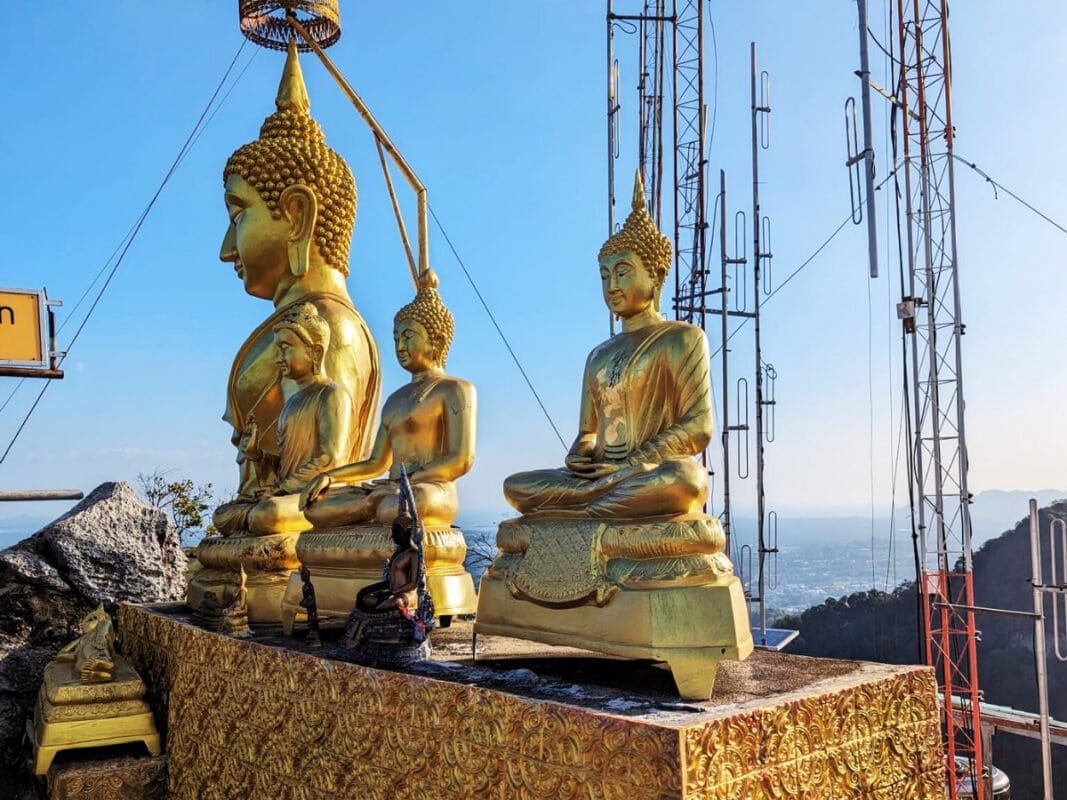
11. Stray Dogs
Stray dogs are a common sight in Thailand, particularly around markets and restaurants.
While most are friendly, some may react unpredictably.
- Feeding Strays – Thai dogs are often found near food sources, and feeding them can lead to unwanted attention. There’s nothing wrong with feeding hungry animals, but be aware that some restaurants may not be pleased if you start sharing your food with a nearby dog or cat.
- Walk Calmly – If approached, avoid sudden movements or direct eye contact with the dog.
- Seek Medical Attention if Bitten – Rabies is a concern in Thailand, so any bites or scratches need to be treated immediately. Find a local clinic that offers rabies vaccinations.
12. Aggressive Monkeys
Monkeys are common in many Thai tourist spots, such as Monkey Beach, Tiger Cave Temple, and the Monkey Trail in Ao Nang.
While they are undeniably cute, monkeys can be aggressive and even bite tourists, especially when they are looking for food.
- Keep Food and Valuables Secure – Monkeys are known to grab bags, phones, or cameras. If you’re heading to an area with a known monkey presence, avoid carrying food to prevent it from being stolen.
- Avoid Eye Contact – Monkeys may interpret direct eye contact as a challenge.
- Don’t Feed or Pet Them – Feeding monkeys can encourage aggressive behavior and draw the attention of an entire group.
- Be Cautious of Monkeys with Babies – Mother monkeys can be very protective of their young, so avoid getting close to them.
- Seek Medical Help if Bitten – Monkey bites can transmit diseases, so if bitten, seek immediate medical attention to get a rabies vaccine at a local clinic.
13. Jungle Hiking
Thailand has beautiful hiking trails, ranging from easy jungle paths popular with locals to challenging mountain treks.
To have a safe trip, it’s essential to prepare accordingly and follow some basic guidelines for hiking in Thailand.
- Download Offline Maps – Internet service can be weak in remote areas, so download an offline map app like Maps.me or Mapy.cz for easy trail navigation. Google Maps may not be the best option in the jungle, so opt for a dedicated trekking map.
- Wear Covered Shoes – Trails are often rocky and full of roots. Having covered shoes will help when hiking on steep paths and protect your feet. I once hiked in flip-flops, hit my toes on a rock, and got stung by a bee—not an experience I recommend.
- Carry Cash – Secluded destinations usually don’t have ATMs, and you may need cash for buying food, renting a kayak, or paying for transportation.
- Bring Plenty of Water – Staying hydrated in Thailand’s hot weather is crucial. Since tap water is not safe to drink, make sure to carry enough bottled or filtered water for your hike.
- Check Trail Conditions – During the rainy season, trails can become slippery or may even be closed. Confirm in advance if the trail is safe and open.
- Wear Breathable Clothes and a Hat – Clothing will protect you from the sun, but opt for lightweight, breathable clothes to stay comfortable and avoid excessive sweating.
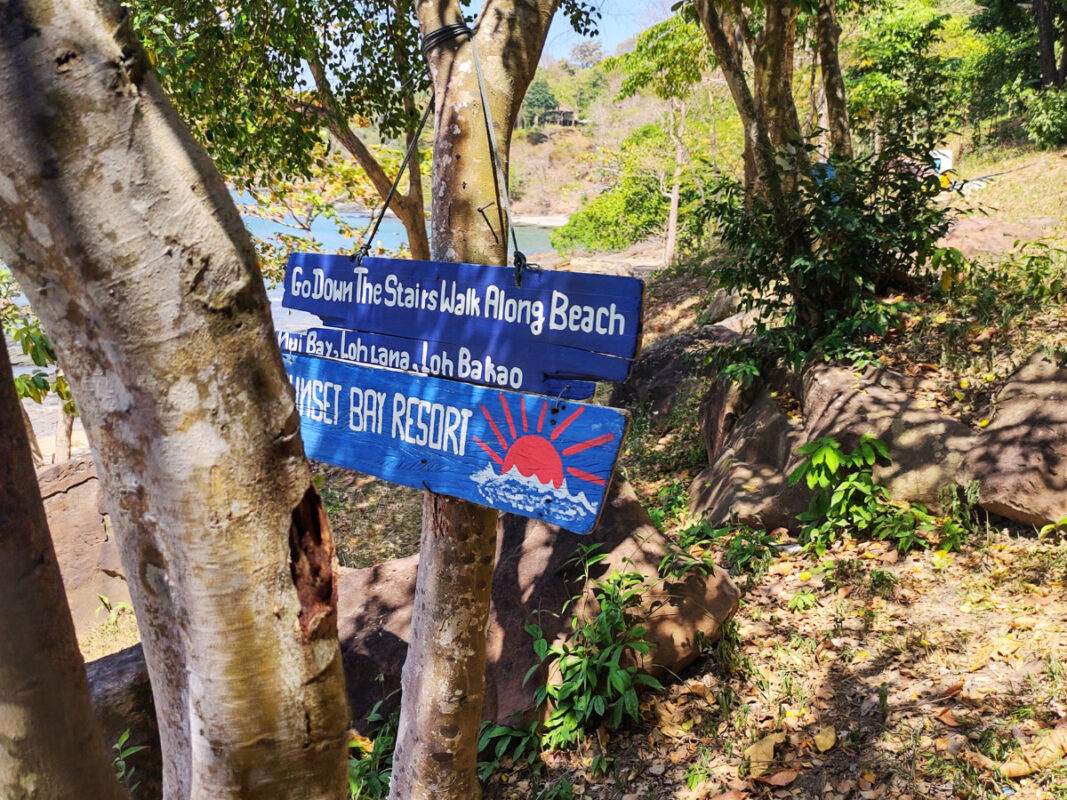
14. Personal Belongings
Thailand offers plenty of adventurous activities, and you’ll likely spend a lot of time at the beach or in the sea.
Always remember to keep your important belongings safe
- Dry Bag – Use a dry bag for boat trips and kayaking. These are widely available in Thailand, and many kayak rentals provide them too.
- Keep Valuables Safe at the Beach – Dry bags are helpful if you want to bring your phone or camera and still go for a swim. Some beach bars that offer snorkeling rentals may also store your belongings safely.
- Limit Valuables – Only bring essentials to the beach or on island-hopping trips. Leave important documents and most of your cash in your hotel room safe.
- Don’t Leave Your Passport as a Deposit – If a rental shop asks for your passport as a deposit (e.g., for scooter rentals), leave cash instead.
- Hotels are usually a safer place to store your passport, but when possible, only carry a copy with you.
15. Pickpocketing
Thailand is generally safe, but pickpocketing can occur in crowded tourist areas such as Bangkok’s Chatuchak Market, Koh Phi Phi Tonsai Pier, or Krabi Town Weekend Night Market.
- Use Anti-Theft Bags – Consider getting a bag with hidden compartments for cash and lockable zippers.
- Avoid Flashing Valuables – Keep valuables like cameras, phones, and cash secure inside your bag or pocket.
- Stay Alert – Pickpockets often work in groups, so be mindful of any “accidental” bumps or distractions, especially in crowded areas.
16. Partying
Thailand’s party scenes, particularly on islands like Koh Phi Phi, Koh Phangan, and Phuket, can be lively and fun.
However, staying cautious is key to enjoying your night safely.
- Drink Responsibly – As in any part of the world, there are occasional reports of spiked drinks in Thailand. Always keep an eye on your drinks and, if possible, go out with people you know.
- Secure a Ride Back – If you plan on drinking, make sure you have the contact number of a reliable tuk-tuk or taxi driver so you don’t have to search for transport in the middle of the night.
- Choose Your Hostel Wisely – Some party hostels or accommodations near popular streets can be very noisy. If you prefer a peaceful night of sleep, read reviews carefully before booking.
- Be Careful Around Fire Shows – Fire shows are an impressive and mesmerizing type of entertainment, but it’s important to keep a safe distance and watch children closely while enjoying them.
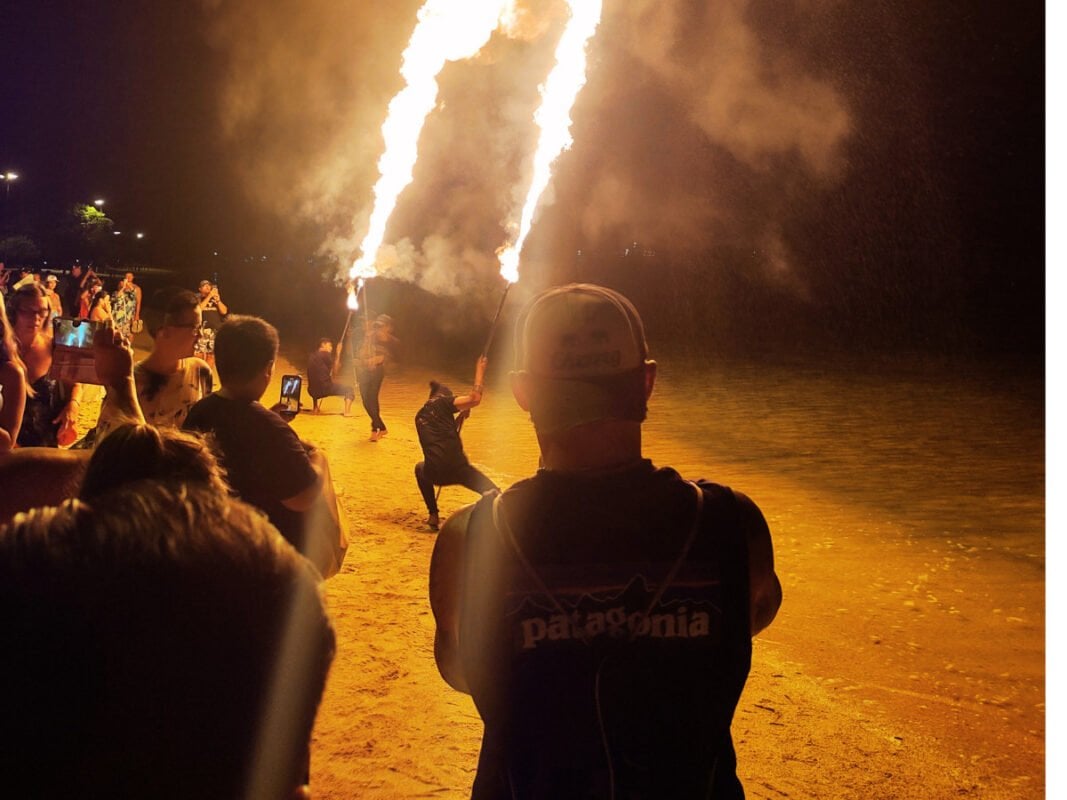
17. Local SIM Card
Having mobile data, while not essential, can make you feel much safer in a foreign country.
It can be a huge help for directions, checking restaurant reviews, or calling for assistance.
Buy a Local SIM
Local SIM cards are easy to find at convenience stores like 7-11. You’ll only need your passport for the purchase.
While buying at the airport is convenient, it is usually more expensive.
You may see shops selling SIM cards tailored to tourists, but these plans can be short and costly.
Opt for a regular plan for better value.
Consider eSIM
An eSIM is a convenient alternative to a physical SIM card.
You can purchase and activate it in your home country before traveling to Thailand, and simply switch your mobile data from your regular SIM to the eSIM once you arrive.
Check if your phone supports eSIM before purchasing.
Although local physical SIMs may be a bit cheaper, an eSIM is very convenient.
18. ATMs, Currency, and Paying
Understanding the local currency and common payment practices is important to avoid potential scams during your trip.
While we didn’t experience any problems in Thailand, it’s easy to miscalculate or overpay if you’re unfamiliar with the currency or typical prices.
Know the Currency
- Thailand’s currency is the Thai Baht (THB).
- Familiarize yourself with the denominations and their approximate value in your home currency to avoid confusion when paying or receiving change.
- Some scams may involve giving incorrect change to tourists who aren’t familiar with the currency.
ATM Fees
- ATMs are widely available in Thailand, but most charge a withdrawal fee of around 220 THB per transaction, regardless of the amount withdrawn or the type of card.
- To minimize fees, consider withdrawing larger amounts at once, but be mindful of carrying too much cash with you.
Use ATMs in Secure Locations
- Preferably use ATMs inside banks or in well-lit, secure areas to reduce the risk of card skimmers.
Cash is King
- While credit cards are accepted at hotels, larger restaurants, and malls, cash is preferred in markets, small shops, and for transportation like tuk-tuks and taxis.
- Always carry enough cash, especially when visiting rural areas.
19. Negotiating Prices
Negotiating is common in Thailand, especially for taxis, souvenirs, and certain services.
Here are tips to help you avoid overpaying while respecting local customs:
- Be Friendly and Respectful – Bargaining is an integral part of Thai culture, and a friendly tone is essential for a good negotiation experience.
- Check Multiple Shops – For tours or souvenirs, compare prices before making a purchase. Many vendors sell similar items, so if you have time and enjoy shopping, browsing can be worthwhile.
- Negotiate with Taxis – If a taxi price seems too high, don’t hesitate to negotiate. Popular tourist spots, especially near piers, often have higher prices, so be prepared to haggle politely to get a fair rate.
20. Taxi and Tuk-Tuk Scams
While most taxis and tuk-tuks in Thailand are reliable, scams can happen, especially in tourist-heavy areas.
My personal experiences have been mostly positive, but we sometimes had to negotiate prices.
- Confirm the Price First – Always agree on the fare before starting your ride, especially for tuk-tuks, as they do not use meters.
- Research Average Rates – Knowing the average fares for certain routes can help you spot inflated prices. Look up rates on internet forums, travel blogs, or ask friends who have been to Thailand.
- Use Ride-Share Apps – In larger cities, apps like Grab or InDriver (the Asian version of Uber) are reliable options to avoid haggling and ensure fair pricing.
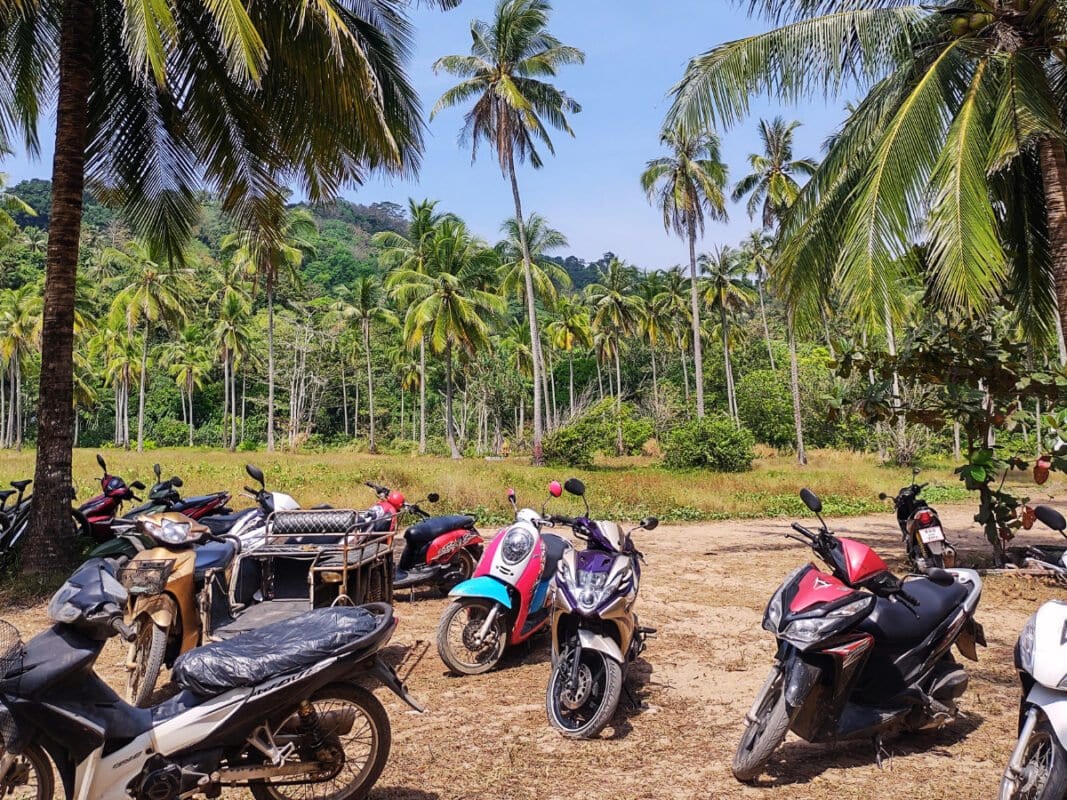
21. Unethical Attractions
Don’t expect anything illegal to be safe.
Some entertainment options in Thailand, such as “ping pong” shows, exploit both animals and individuals in very disturbing ways.
To make responsible choices, keep these points in mind –
- Avoid Exploitative Tourism – Do your research and seek out ethical entertainment options. Thailand has plenty of cultural shows and traditional performances to enjoy for a more positive experience.
- Be Aware of Local Laws – Participating in illegal activities is risky for everyone involved and can lead to severe consequences.
- Consider the Impact – Supporting or taking part in exploitative shows contributes to unethical practices and can be deeply unsettling.
Final Thoughts
Thailand is an incredible destination with so much to offer.
Stunning landscapes, vibrant culture and warm hospitality.
By being mindful and prepared, you can fully embrace the adventure and create lasting memories.
Following these safety tips and respecting local customs will help you enjoy a worry-free journey.
Safe travels, and enjoy every moment of your trip!
Read My Other Posts about Visiting Thailand:
- Guide to Jungle Trekking in Southern Thailand
- How to Rent a Scooter in Thailand – A Practical Guide
- How to Spend 7 Days in Krabi, Thailand: The Ultimate Adventure Itinerary
- 20 Proven Reasons Why You Should Visit Krabi Town, Thailand
- Unforgettable 4 Days on Koh Phi Phi, Thailand – Detailed Itinerary
- 24 Hours on Koh Phi Phi, Thailand – Detailed Itinerary
- 11 Best Hikes on Koh Phi Phi Don, Thailand – Detailed Guide
- How to Do Coastal Hike to Long Beach (Haad Yao) on Koh Phi Phi – Detailed Guide

